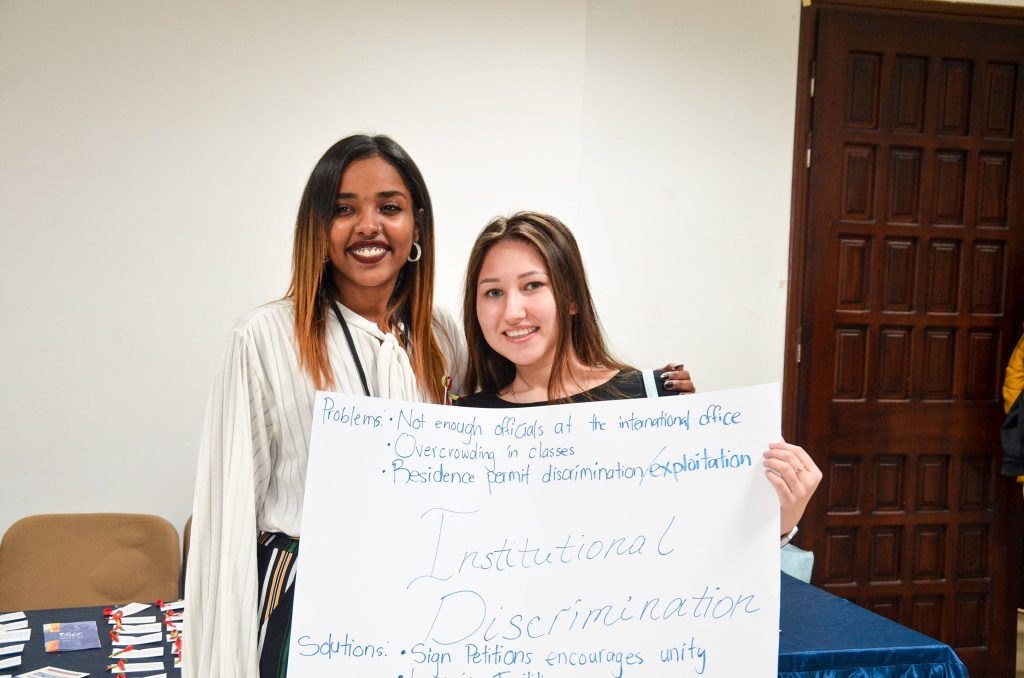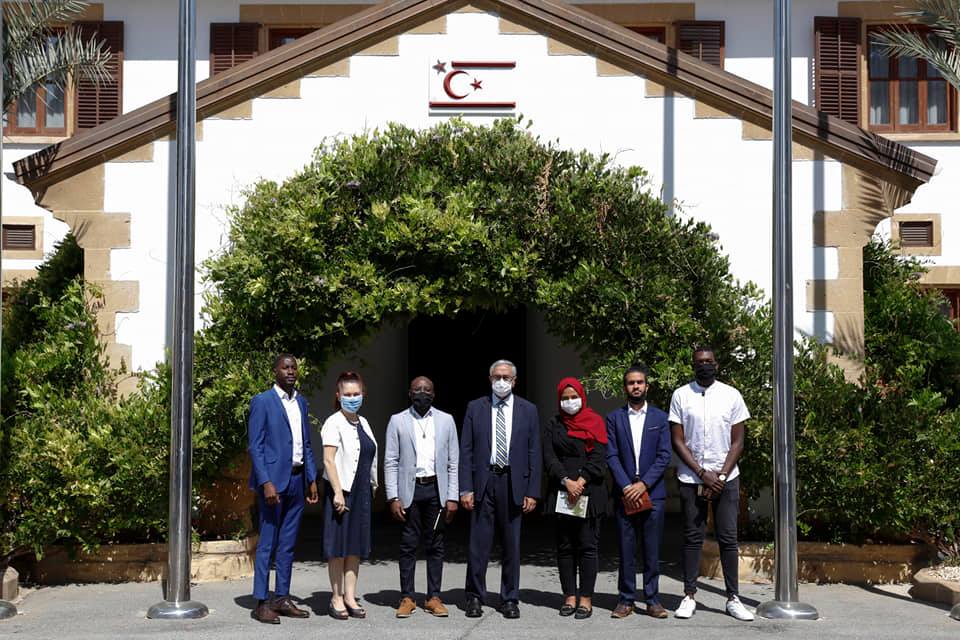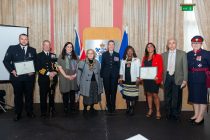I am an MBA student in a lesser known part of the world called the Turkish Republic of North Cyprus (TRNC). For those who have never visited, it is one of two states on the island of Cyprus, located in the Eastern Mediterranean.
In the southern part of the island is the internationally recognised Republic of Cyprus, where the Greek Cypriot population live. The TRNC is home to mainly Turkish Cypriots, but it has a rapidly growing international community, thanks mainly to foreign students like me.
Higher education is one of the TRNC’s biggest sectors. In 2019, the sector turned over $1 billion in revenue from 102,000 students studying at 21 Turkish Cypriot universities. About 55,000 students are from nearby Turkey, and a further 30,000 are from Africa.
Having immersed myself in local life and politics, I can see many fantastic opportunities for this small country and its 380,000-strong population. Yet the TRNC needs to be proactive and adopt some important policy changes to maximise its prospects of becoming a financially self-sufficient state. Here are my five top tips.
1. English Language:
Yes, you read that correctly. One of the easiest ways for any country to show they are ready for the outside world is by the ability of its citizens to read, write and speak English – the international language of business.
Cyprus was once a British colony and many of the older generation still speak some English. However, outside of this age group, most Turkish Cypriots struggle with the English language. This limitation can have a profound impact on the country’s future.
The official language of the TRNC is Turkish. It is a rich and versatile language, but Turkish is not an international language.
To be clear, I’m not advocating North Cyprus drops the Turkish language. Not at all. For a start the TRNC’s biggest trading partner is Turkey, and while even fewer people speak English there, it makes sense everyone speaks Turkish fluently in the TRNC.

However, the business communities in either country would be the first to acknowledge that international transactions are most commonly conducted in English, so if English became the TRNC’s second language, international trade would become far easier and faster for them.
Nearly all schools and further education institutions in the TRNC offer English language classes, but most of the teachers are not native speakers, which doesn’t always result in the best standard of the language being taught.
Thankfully, there is an easy way to fix this. In exchange for work permits and a decent income, the TRNC can leverage its foreign population whose English language skills are often far stronger.
Indeed, if the Turkish Cypriot government altered its current employment policies to allow international students to work, they could easily fill this gap in both public and private elementary and high schools, and the English language problem could be fixed in the next 5-10 years. There is also a big PR benefit to such a sustainable programme.
2. Intentional Integration:
The treatment of foreigners, especially of African descent, whether workers or students, by employers, tradespeople and universities in North Cyprus is bad, really bad. There have been problems with landlords refusing to rent to African students, employers withholding wages of foreigners, and more.Organisations like VOIS Cyprus (Voice of International Students) have published several reports on the problems their members face. One VOIS report over the summer covered the damning findings in asurvey of 500 foreign students, where 80% claimed they had experienced racism in the TRNC. VOIS Cyprus and other groups representing foreign residents have lobbied the TRNC government on these serious issues on a number of occasions. Sadly, beyond some sympathetic words, we have yet to see any meaningful action.
This experience doesn’t tie in with the kindness and warmth that the Turkish Cypriot people are known for, and I have witnessed personally. That said, there needs to be a political will and societal support for North Cyprus to fully integrate its foreign population.

The country’s political isolation means the TRNC outlook isn’t very global. Instead we see that an archaic traditional, and often nationalistic mindset exists – even among those who consider themselves “leftist progressive”. Government policies to protect and support foreigners are not well conceived, often due to insufficient consultation. Even where laws exist, monitoring and compliance is limited, topped by poor government communications, which all contribute in varying degrees to the problems around integration.
I therefore recommend a national conference, held once every year. Strategically focused, it should be inclusive of all parties (gender-wise, as well as including citizens, students and foreigners alike) to break down these communication gaps, share ideas and strategy, and shape policy about nation-building with a path to execution and implementation all the way to the national parliament. It should ideally be a week-long to allow for a culture showcase, perhaps even sports, but I digress.
Alongside this, a Migrant Advisory Committee (MAC) can also be formed, which can meet more regularly to oversee the policies agreed at the conference. The MAC should also have a diverse make-up of international students, foreign residents, MPs, journalists, and commerce and industry reps, who can address issues as they arise, and monitor progress. Each group has its own needs, but by facilitating a cross-fertilisation of views will significantly improve understanding across society and greatly enhance integration.
3. Coding and 21st Century Employment Skills:
Around the world, traditional job titles and work arrangements are gone, replaced by new roles and skills that are required to compete in the global marketplace. Covid-19 has accelerated this process everywhere in Europe but, it seems, in North Cyprus.
Jobs are still very traditional, and the use of technology in the workplace is still very much in its infancy; even things as basic as a website or secure sockets layer (SSL) on existing sites are rare.
This knowledge and skill gap are nowhere as obvious as in the labour market where available jobs range from the civil service to assistants in shops, restaurants, and other small-scale family-owned businesses.

Two service sectors dominate the TRNC economy: tourism, which is the biggest driver of revenue for Turkish Cypriots, followed by higher education. Together they account for around 40% of the country’s GDP.
To enable the population of North Cyprus to ramp up their skill set and compete on the global stage, there needs to be a deliberate effort to teach coding, digital marketing, data analytics and similar skills, ideally from primary school age through to high school. Special coding and digital skills programmes need to be developed for adult learning too, so help re-skill the existing workforce.
Again, as with teaching English, the TRNC government can leverage its foreign students and residents to transfer these essential skills professionally to the rest of the population. The fruits of such a policy can be quickly realised, and the workplace transformed in five years.
4. Job and Labour Policies:
The population of North Cyprus is growing, from its own citizens, foreign residents and the international student population as well. This in turn is putting pressure on existing infrastructure and the cracks are starting to show in the ability of the TRNC to cope, especially its national healthcare system.
The international student community pays a premium every year to access healthcare in the TRNC without any attendant benefits to show for it. Yet, these premiums keep going up every year. Then there are the blocks on employment for foreign students, despite there being a need for us, which forces people into taking jobs illegally with all the exploitative risks that entails.
It is interesting that the government has a host of highly competent international students willing and able to take on these problems, but the body language shows a refusal and a nonchalance to these things beyond rent collection and student fees.
Like any country around the world, it is quite understandable that North Cyprus puts its own citizens first. Germany has solved this problem by simply putting a time limit on vacancies. If they are not filled within a timeframe, as stipulated by the government, then everybody else is welcome to apply. Should the foreign worker be hired, they receive a proper employment contract, all attendant permits, and access to state services.

The current TRNC employment policies contain a lot of restrictions, bureaucracy and glass ceilings. In fact it would appear as though a different policy exists for TRNC citizens and those from Turkey and the EU citizens, with people from developing countries last in the work pecking order. This is odd as the bulk of full-fee paying students are from African countries such as Nigeria. This discriminatory policy means that a large pool of brilliant young and eager minds is excluded from the TRNC work place.
A policy refresh is long overdue in this regard. Any future planning by North Cyprus officials will quickly reach the conclusion that a strong, well-skilled, vibrant, and diverse workforce makes the country more competitive and attractive for investors.
5. New Businesses and Start-ups:
According to American business television channel CNBC, around 26% of students start businesses after graduation. If that applied to the 85,000-plus international students in the TRNC, there could be thousands of new businesses in North Cyprus each year.
The fallout of the Covid-19 pandemic on the TRNC economy is reflected by the desperate manner in which universities in North Cyprus are scrambling for new international student enrolments to help with their balance sheets. The impact of the virus on business will remain for some time, and it is very clear the country needs all the help it can get.
The current modalities and restrictions to set up a business for foreigners is ridiculous and glaringly restrictive. The Estonian model for business registration clearly shows that there are ways around this to benefit both the country and citizens, and foreigners without exorbitant fees. The TRNC government can encourage international students to set-up businesses by cutting away much of the bureaucratic red-tape and reducing excess taxes and fees levied against them.
It is no secret that the engine of the economy are small and medium-sized businesses. More businesses mean more jobs and tax revenues for the TRNC, and ultimately, a bigger, stronger economy.

In summary, a lot of the problems faced in North Cyprus are not new and are quite easy to solve. Immigration has helped stimulate economic growth in countries like Canada, Australia. Germany and to a large extent, the United Kingdom. They have all identified the direct correlation between friendly immigration policies for all, regardless of ethnic origin or nationality, with friendly, flexible job policies and international student enrolments.
Canada and Australia saw a 16% and 15% rise respectively in their international student enrolments by simply increasing the period of stay an international student is eligible for after completing their education to three years (Canada) and 18 months (Australia). The UK government is adopting a similar policy from 2021.
Even for a country as rich, popular and powerful as a United States, unfriendly immigration and jobs policies for international students has led to a steady decline in numbers since 2016. As a result, there has been a significant drop in revenue generated from higher education, down from $45B to about $23B, in addition to over 65,000 jobs lost according to CNBC.
The global number of international students have doubled since 2001 to over 5.3M globally and still growing. However, those countries with unfriendly polices on immigration, employment and entrepreneurs are seeing a decline in enrolments. Anyone in North Cyprus connecting the dots?
The TRNC government has a unique opportunity to redefine the future, make up for the time lost over the last 46 years and help the Turkish Cypriots take their place in the world. The question is: will they?
Main photo, top of President Mustafa Akıncı meeting VOIS Cyprus representatives at the TRNC White House, 31 Aug. 2020. Photo © Facebook / VOIS Cyprus





